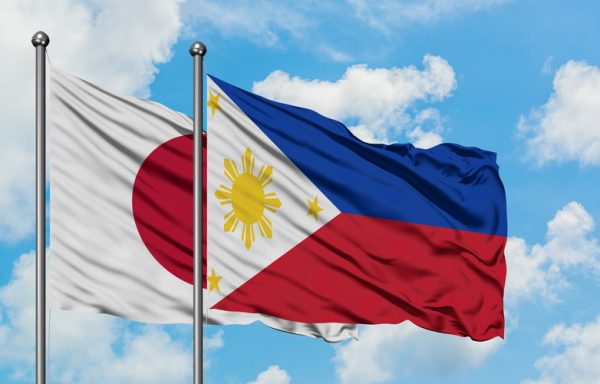
Japan and the Philippines have agreed to bolster security cooperation and expand joint military drills to counter China’s increasing maritime assertiveness, their defense ministers said yesterday.
During a meeting in Tokyo, Defense Minister Kishi Nobuo and his Philippine counterpart, Delfin Lorenzana, reaffirmed the importance of maintaining and strengthening a “free and open Indo-Pacific,” and said that attempts to change the status quo by force were “unacceptable,” according to a statement from Japan’s Defense Ministry.
At the outset of the meeting, Kishi reportedly condemned Russia’s invasion of Ukraine, describing it as “unquestionably a unilateral change of status quo by coercion and a clear violation of international law.” As is usual in these sorts of statements, China was not mentioned by name, but Kishi’s references to “coercion” and “unilateral changes to the status quo” clearly also applied to Beijing’s increasingly assertive maritime behavior, which has courted friction with both the Philippines and Japan.
Over the past decade, the Philippines has experienced repeated and prolonged Chinese incursions into its Exclusive Economic Zone. Last month, the Philippine Coast Guard (PCG) announced that Chinese vessels had maneuvered dangerously close to PCG vessels on at least four occasions over the past year near the disputed Scarborough Shoal.
In particular, the PCG reported “a close distance maneuvering” incident involving a Chinese Coast Guard vessel during a maritime patrol operation close to Scarborough Shoal on March 2. The Philippines later lodged a diplomatic protest against China over the incident, with National Security Adviser Hermogenes Esperon Jr. stating that “we, as a nation, will stand by our established sovereign rights and sovereignty over the area.” China has undertaken similarly assertive actions near the Japan-controlled Senkaku/Diaoyu Islands in the East China Sea.
The agreements are just the latest indication of the strategic convergence between Manila and Tokyo, due in large part to shared concerns about China’s waxing power. “The Philippines is an island nation like Japan, a littoral state in the South China Sea, and an ally of the United States like Japan,” Kishi told reporters after the meeting. “We consider it a very important country.” Lorenzana responded by saying that they have shown “both countries’ dedication and commitment to further strengthen our overall bilateral defense relations.”
Relations between Tokyo and Manila have long been fruitful, a reality perhaps best symbolized by the fact that Japan is the one major country that maintained good relationship with both the pro-U.S. President Benigno Aquino and his successor Rodrigo Duterte, who indulged in anti-American recriminations and steered the Philippines into closer relations with China.
Under the former, Japan and the Philippines signed a strategic partnership in 2011 and in February 2016, brokered a new defense agreement allowing the transfer of defense equipment and technology from Japan to the Philippines. Under Duterte, in August 2020, the two nations agreed to the Philippines’ purchase of a warning and control radar system developed by Mitsubishi Electric – the first sale of Japanese defense technology to a Southeast Asian nation. In their meeting yesterday, Kishi and Lorenzana agreed to bolster these transfers of defense equipment and technology between the two countries.
This steady upward trajectory suggests that Philippine-Japan relations will continue to deepen, no matter who prevails at this year’s presidential election.
Japan, Philippines Agree to Boost Security Cooperation
Source: Frappler

0 Comments